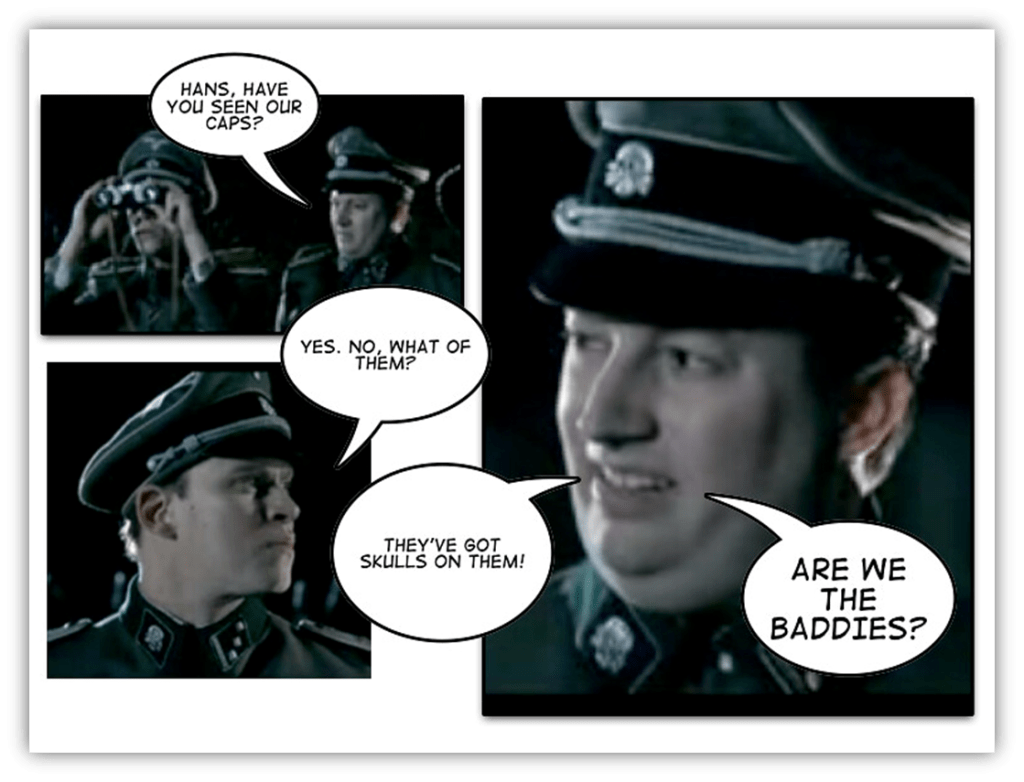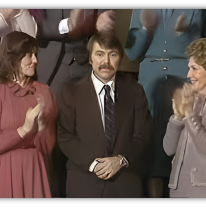Another in an occasional series on things that never fail to crack me up, for reasons I can never fully explain
Sometimes, it’s the surprise of the moment.

A spontaneous, unplanned twist that catches you off guard and makes you laugh out loud.
But other times, it’s not about randomness or off-script ad-libbing, but instead, the precision of well-crafted writing.
An excellent example is a sketch from That Mitchell and Webb Look, a BBC series that gave us some of the most quotable British comedy of the 2000s.

You mighty be thinking that we’re talking about their famous, “Are we the baddies?” sketch.
Or, the absurdist genius of Numberwang.

Nope. It’s a different, lesser known bit from the show. One that’s smartly crafted, with writing that sets up a premise, develops it methodically, and delivers a perfect punchline, all in under two minutes.
Many sketch comedy shows tend to meander, and rely on repetition to be funny.
Even more disappointing:
If you’ve ever thought that their bits don’t always seem to have a proper ending, you are not alone.

During its storied 50-year history, Saturday Night Live has often fallen into this trap.
Such sketches might garner a chuckle or snort. But there’s another way to get to the funny:
Let me introduce to you a sketch that has the comedic courage to have a proper beginning, middle, and end.
It’s precision-crafted comedy at its finest. First, a little context:
The BBC comedy series That Mitchell and Webb Look ran from 2006 to 2010.

This was during a time that many consider to be a golden revival period for British sketch comedy. It was an era defined by smart, character-driven writing that balanced absurdity with biting social commentary.
It was an ideal backdrop for the duo’s approach to flourish.
The show grew out of David Mitchell and Robert Webb’s successful partnership on the sitcom Peep Show, and an earlier radio series:

That Mitchell and Webb Sound: which helped hone their chemistry and sharp, witty style.
Shifting their comedy from radio to television opened up new territory, allowing them to experiment more freely, and craft the humor with greater precision and wit.
The Brain Surgeon Sketch: Arrogance Meets Irony
The premise is simple: David Mitchell plays a smug professional who manages to monopolize the conversation by never ceasing to remind everyone – multiple times – of his lofty status, with the same dismissive phrase:
“Well, it isn’t exactly brain surgery.”

With the accent on brain, for added dismissive emphasis.
With his gloriously self-important delivery and a gift for playing insufferable characters, Mitchell was perfectly cast as the pompous partygoer. We immediately dislike the character, but we’re also slightly fascinated by his complete commitment to his own superiority.
The writing is economical in the way that only the best sketch comedy can be.
We’ve all met this person:

The one who never misses a chance to remind you that their job is tougher, their stress more valid, and their expertise more important.
But in the end, the good doctor gets a taste of his own medicine.
So: What’s So Funny About It?
Now, finally, back to my original question: why does this two-minute sketch make me laugh?
I think I’ve figured out why. It’s a perfect storm of setup and payoff.
The sketch takes something we all recognize: professional arrogance and dismissive language, and builds it to an almost uncomfortable level – before delivering a most satisfying comeuppance.
But beyond the schadenfreude, there’s something more sophisticated at work.
The sketch is really about the arbitrary nature of superiority and the way people use their expertise to diminish others.

By showing how quickly the tables can turn, it reveals the fragility of these constructed hierarchies.
In our current age of social media experts and “instant authorities,” the sketch feels more relevant than ever.
We’re surrounded by people who dismiss others’ struggles while elevating their own expertise. The egotistical doctor’s due reward serves as a cautionary reminder that there’s always someone higher up the ladder, always someone who can deflate your pretensions with a single phrase.
The beauty of the sketch is that it doesn’t need to be long or complex to be effective.
Two minutes is all it takes to set up the character, establish the pattern, and deliver the punchline that recontextualizes everything that came before.
As we all know, comedy is subjective. But this kills me. See if you agree.
While I don’t claim to have all the answers about why certain things are funny, I do know genuine laughter when I hear it.
And this sketch?
It’s crafted with flawless precision!
With amazing timing!
With –
Sorry. I’m getting carried away. It’s just a silly TV bit. I shouldn’t assign this kind of importance to a silly TV comedy sketch…
After all, it’s not exactly brain surgery…






Beautifully done sketch indeed! By the way, your statement about Saturday Night Live is absolutely true. In the oral history about the show, someone mentioned how longtime executive producer Lorne Michaels would’ve preferred ending each one of them with a cow dropping on the actors if they couldn’t come up with anything that worked. I blame some of that for his work previously on Rowan and Martin’s Laugh-In, which was so crammed with short comic bits that they really didn’t need a finisher most times.
Having a good sketch ending also bedeviled most of the writers for The Carol Burnett Show, at least the ones I’ve interviewed. In its first few years, they relied on the crutch of having someone fall our of a window or, in the case of the Carol and Sis sketch, have someone (usually Carol) get hit in the head by an opening door. Having said that, I think the show did a very admirable job in having pretty successful closers for the majority of its run. Perhaps the most inventive one involved Mr. Tudball (Tim Conway) struggling with a coffee dispensing machine and getting grief from a security officer (Harvey Korman) in the process. When Tudball finally got his coffee straightened out, his dingbat secretary Mrs. Wiggins (Carol) came out and grabbed the cup and left saying “Free coffee!” before Tudball could stop her. A perfect payoff in my book.
I like Robert Webb and David Mitchell. Mitchell does a lot of panel shows and is very funny, portraying himself as intelligent, slightly posh, irritable and confused by popular culture. As an actor he has possibly the most limited range imaginable. Doesn’t matter who the character is and what situation, he basically plays it with exactly the same persona as when not acting. It works.
Whereas when it comes to Mitchell and Webb as a comedy duo, they don’t quite work for me. I get why its funny and I watched all of That Mitchell and Webb Look thinking there must be something I’m not getting but it never made me laugh. Numberwang may well be their most famous sketch but all it gets from me is a wry appreciation without inducing a laugh.
Me and Mrs J had afternoon tea with David and his wife once. Nearly. We were in Betty’s Tearooms in Harrogate, living our best life (try the Fat Rascals, they’re delicious), it was a birthday treat for Mrs J. David and Victoria (who is also a very funny and extremely clever TV personality and writer) came in and took afternoon tea over the other side of the room. Yet another mundane anecdote of my (non) interactions with the rich and famous.
I was hoping that a card carrying honorable subject of the king would chime in here.
For my entire life, I’ve heard people say that British humor is “dry“, and to this day, I’m not entirely sure what that’s supposed to mean. A lot of it works for me, and a lot of it goes right over my head.
International appreciation and translation of what people think is clever and funny is always puzzling. Ask any average American what they think of Jerry Lewis, and it will widely differ from the opinion that the French have of his work.
Dry humour to me is deadpan or emotion free delivery, clever wordplay play and irony. I don’t know that its particularly British as the ultimate exponent of that approach to me is Steve Wright.
I love trying to write jokes. I came up with this one about three years ago:
“I’m really worried about my new dog. He won’t do anything. I hope he’s not sick, or something. I’m going to have to take him to the vet. He won’t do anything; he just sits there and stares at me.”
“Poor Stay.”
And then I learned about this. Suffice to say I will not be trying this one at an open mic anytime soon.
https://youtube.com/shorts/iIPKCTUIqB0?si=7OqT2T4ghLasB3fu
Oh my goodness, we need more Steve Wright.
My son turned me on to “Only Connect” and I’ve been a Victoria Coren Mitchell fan ever since. She’s smart, quick, and delightfully bizarre.
Though her appearance on Taskmaster, coming last on her series, proved that being smart, quick and delightfully bizarre does not translate to logical thinking when faced with delightfully bizarre tasks.
That’s a show that I know about but haven’t dug into yet. I’m still catching up on Eight Out Of Ten Cats Does Countdown.
Just like music, comedy is very subjective. Some like dry humor, some like awkward humor, some like slapstick, some like gross-out humor. This is the funniest one you’ve posted yet, mt.
That’s so interesting; someone just emailed me directly and told me to “step it up; this wasn’t funny at all.”
I didn’t say it was good. But it was the best so far.
HA! See…that was comedy. No…some of the others I didn’t appreciate as much, but I liked this one. 🙂
Oof. Tough crowd!
😅
Wow — even if I thought that (which I didn’t), I would certainly never say that to you like that. Maybe you have a more direct relationship with that person? I find it rude.
No relationship; just someone who read the piece.
You wouldn’t believe what I see via email. It comes with the territory…
Thanks for being “the buck” that stops such comments from making this the cesspool that lots of comments sections (aside from our origin space and this) have become.
One way to prevent this is to require registration or log in at least before commenting. I’m a big fan of “the more the merrier,” but it’s an unfortunate necessity.
I can’t recall the last time I had to delete an offensive comment. I think in 3 1/2 years, it’s happened maybe once.
It speaks to the kindness and character of our audience.
I really, really endeared myself to the mothership by obnoxiously proclaiming that the political comedy on SNL isn’t funny. Ah, regrets. But, but, but in my defense, Lorne Michaels proved this years prior when Tina Fey recreated her counterpart’s speech in verbatim. Dana Carvey’s Bush was funny because he created his own version of the late president. The real George Herbert Walker Bush had practically nothing in common with Carvey’s Bush.
That was great.
You’re laughing before the punchline.